Don Dines in Athens: In/Out Eating
Not all surprises are pleasant, but...
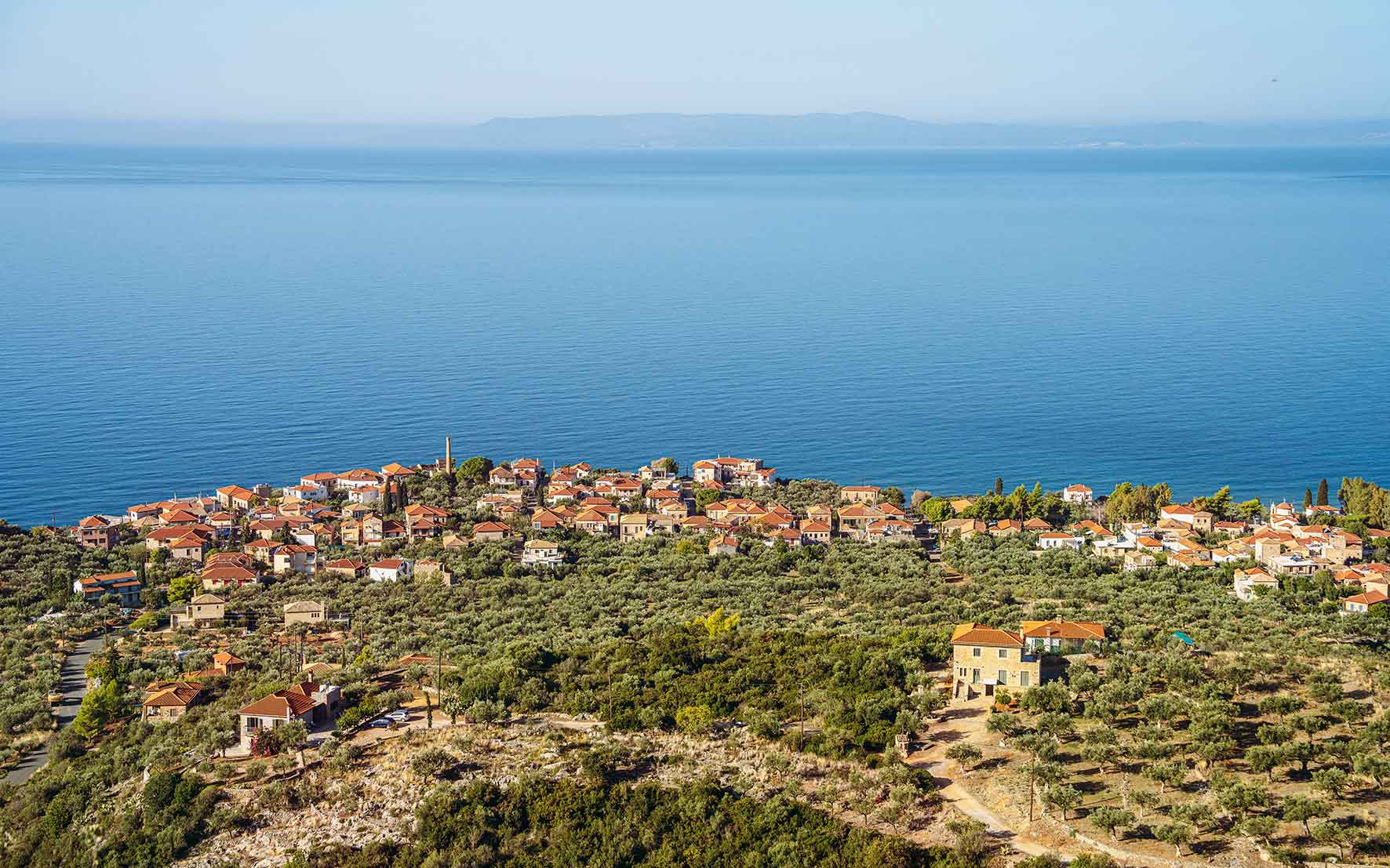
Hike from Exohori to Kardamyli, with the olive groves and the Messinian Gulf in the background.
© Nicholas Mastoras
Forty-five kilometers north of Kalamata, in Parapougi, there is Ben Olive Mill, an olive facility open to tourists and owned by Pavlos Kaplanis, grandson of Benakopoulos – hence the “Ben” in the brand name. There, six visitors – two New Zealanders, two Australians and two German women – stand in the middle of the Messinian olive grove, listening spellbound to the story of the olive from Pavlos’ lips. He says that the olive tree is considered the mother of trees, that it needs water but mostly sun and that “it remains productive, regardless of age, as long as you take care of it.” He also notes that today’s conditions favor the production of an oil that is of higher quality than in the past, since the transport of the olive from the field to the oil press and the oiling process are done more quickly. Then, he mentions that there is a strange-looking olive tree in the olive grove that, despite being struck by lightning, remains alive; as a result, it currently has three generations of trunks.
The party of six listen to Pavlos while touring the estate. Along the way, they cut and smell the lemongrass, observe the marks left in the soil by wild boars foraging for mushrooms, and learn about the local fauna, which consists of foxes, birds of prey and snakes, among other creatures.
Ben Olive Mill: Tel. (+30) 27240.323.71, www.benolivemill.com. Visit by appointment.
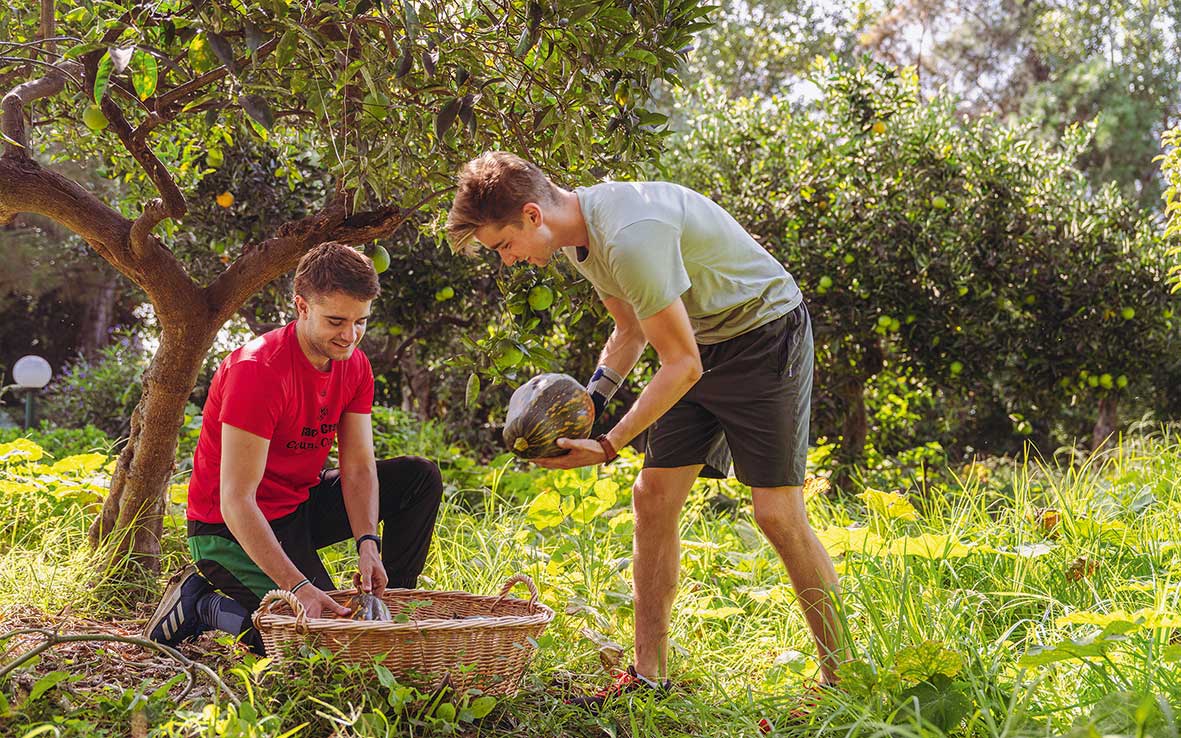
Two young volunteers from abroad, hard at work on Fifa Farm.
© Nicholas Mastoras
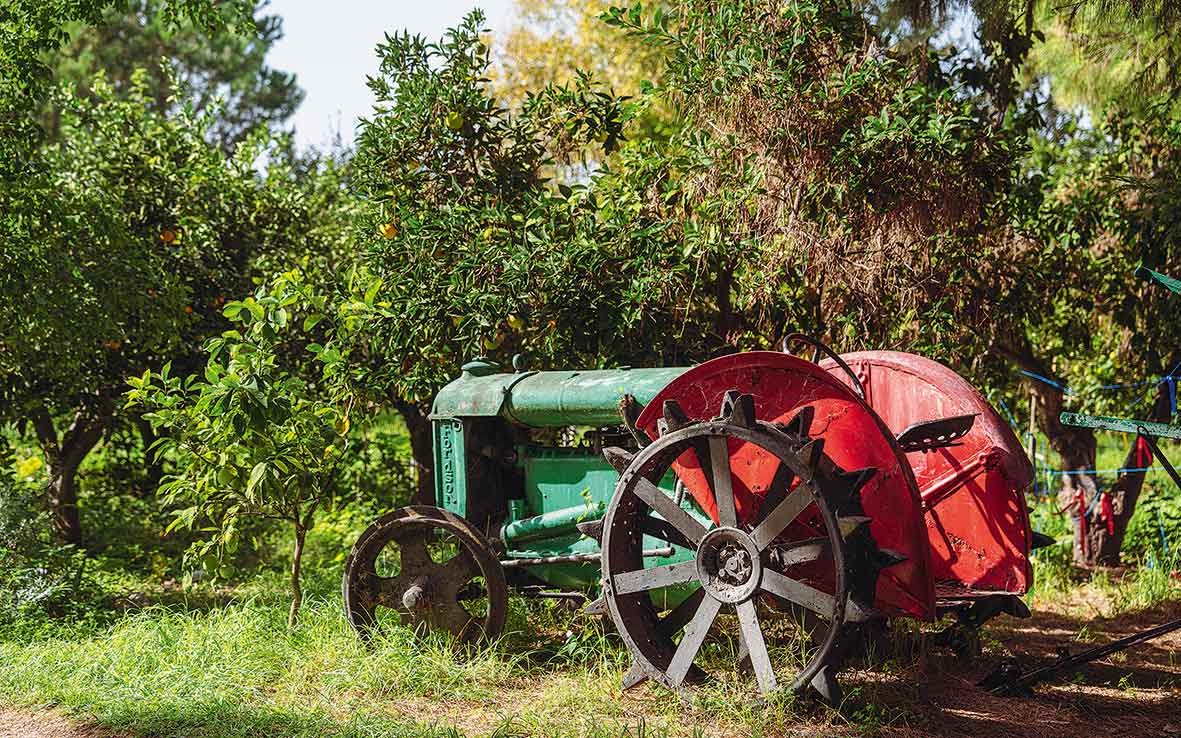
A derelict tractor at Fifa Farm, testament to a bygone era.
© Nicholas Mastoras
Our visit to Pavlos’ olive grove was the first stop on a journey focused on nature, the land, the raw materials, and the gastronomy of Messinia, which we would explore over the next few days. It was a great first introduction to the prefecture’s burgeoning agritourism sector.
Our next stop was Fifa Farm, perhaps Kalamata‘s best-kept secret for nature lovers. Without its location being conveniently pinpointed on Google Maps, there was no way we would have ever imagined that in the middle of Iroon Polytechniou Street, nestled among carpet factories, garages, and gas stations, we’d find a piece of paradise on earth. Traveling down the street and catching sight of the farm’s lush green expanse instantly lifted our mood.
The tiny farm covers a mere 0.8 of a hectare, but the history of which is intertwined with the history of the city itself. “In the 19th-20th centuries, the institution of agricultural stations was established. Large tracts of land belonging to the Kingdom of Greece were distributed along with seeds to farmers for cultivation, with the latter returning seed and produce. Essentially, the agricultural stations functioned indirectly as agricultural schools. The Kalamata station ended its operation in 1908.” The land was then divided up and sold, and a part of it came into the possession of the family of Myrto Fifa, the current manager of the estate.
Fifa Farm: Tel. (+30) 27210.225.05, www.rethink-project.gr. Visit by appointment. If you are interested in composting, at Fifa Farm you will find a lot of information about the composting network that its members have set up in Kalamata, Athens, and Thessaloniki.
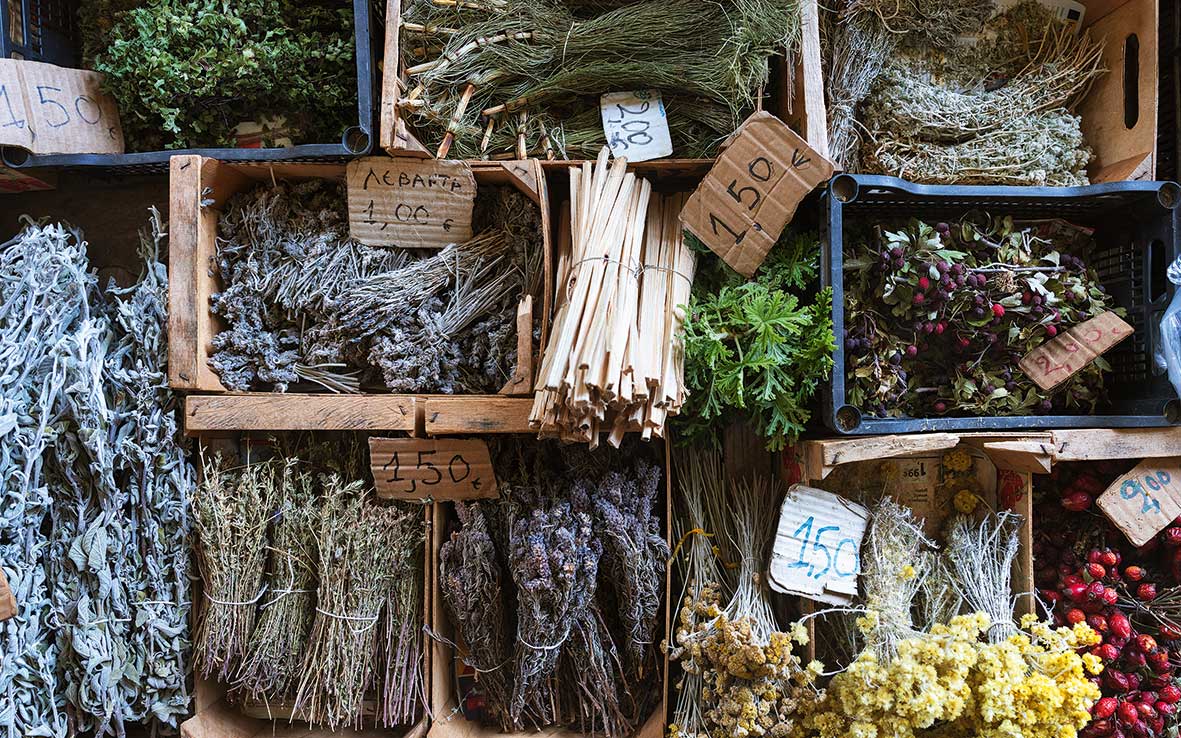
At the farmer’s market of Kalamata. Every Wednesday and Saturday, fresh, locally grown products fill the stalls.
© Nicholas Mastoras
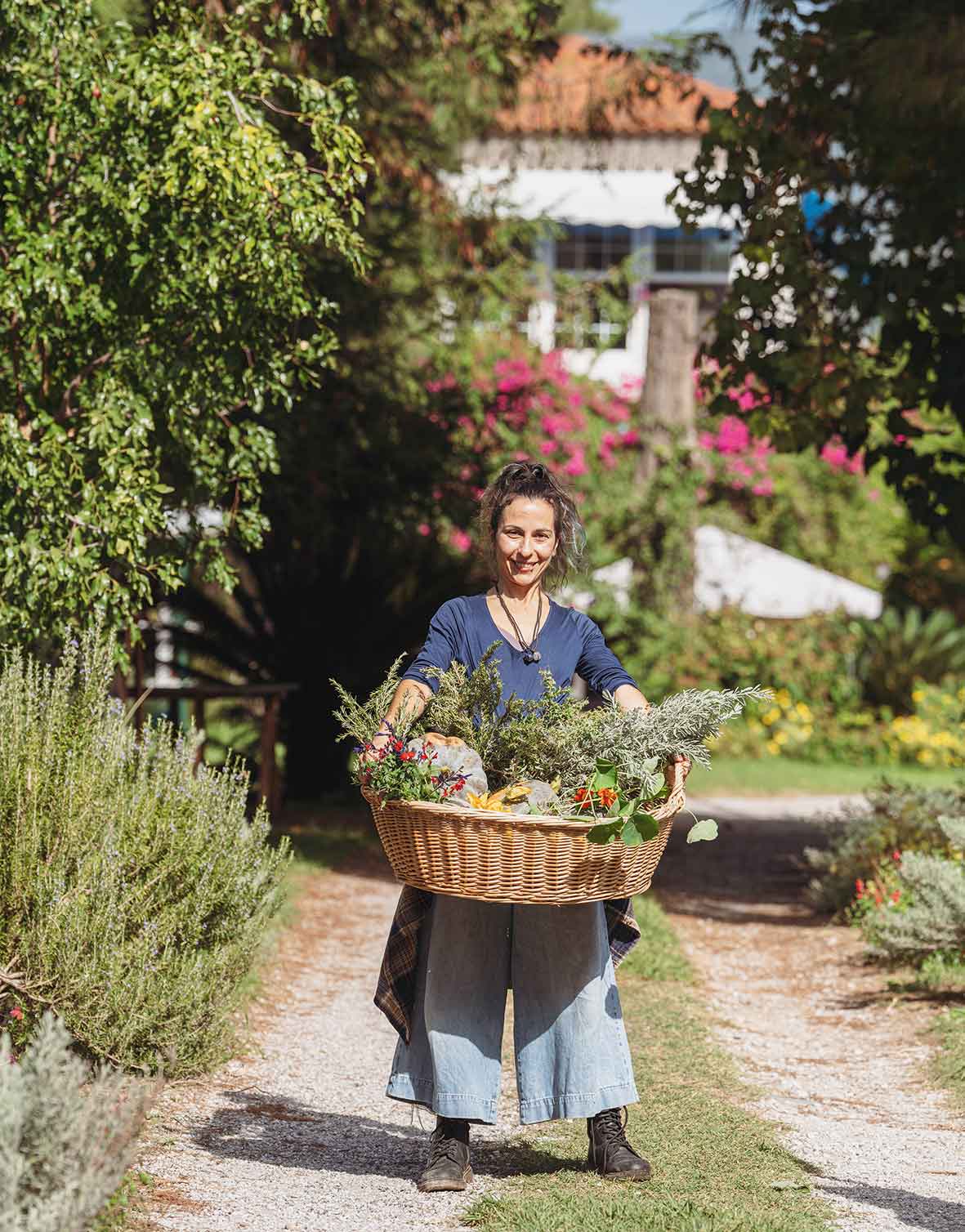
Holding a basket brimming with fruits, vegetables and aromatic herbs, Myrto Fifa shows off a sample of the farm’s production.
© Nicholas Mastoras
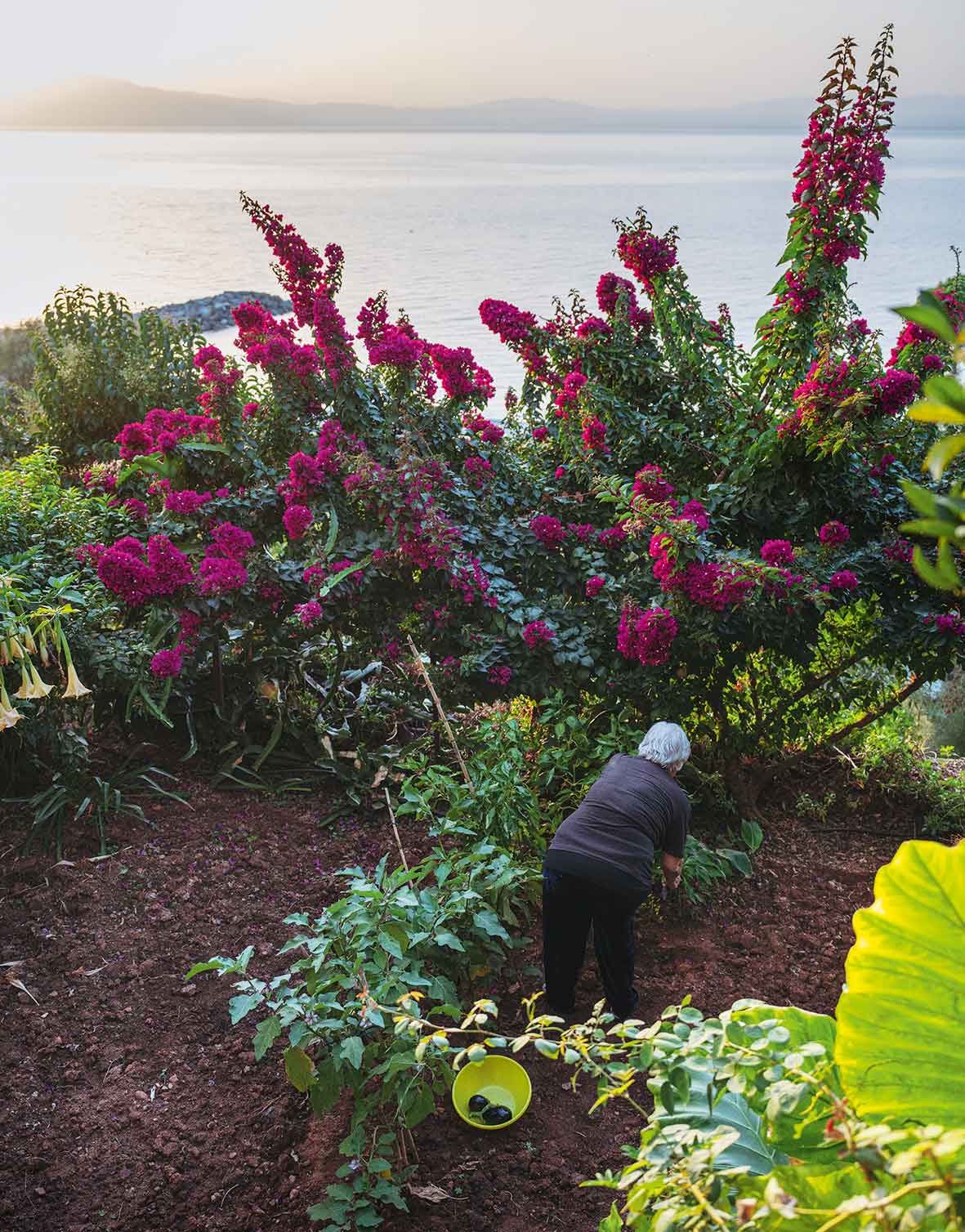
Agritourism in Messinia starts from the homes of the locals, as in Mikra Mantineia, in the garden of Mrs Stavroula Giannopoulou.
© Nicholas Mastoras
Dynamic and methodical yet calm and sweet, Myrto, together with the partners, friends and volunteers of the estate, takes care of the dream habitat with its countless plant species: forest trees (sequoias, casuarinas, pines, poplars, acacias, Monterey cypresses, eucalyptuses and plane trees), fruit trees (orange trees, tangerine trees, lemon trees, sanguine trees, olive trees, pear trees, apple trees, apple pear trees, mulberries, loquats and avocados), and herbs (salvia, lavender, thyme, marjoram, oregano, artemisia, borago).
It’s a proper botanical garden, complete with its own microclimate that attracts many species of birds. The small estate is the basis for all kinds of activities, such as picnics, and serves as a school of nature (educational programs for schools, agencies and adult groups) and seed exchange, with its very own seed bank. If you love nature – whether you’re alone, with a group, or with your family – it’s well worth visiting; it’s one of those rare places that leaves you feeling optimistic for the future.
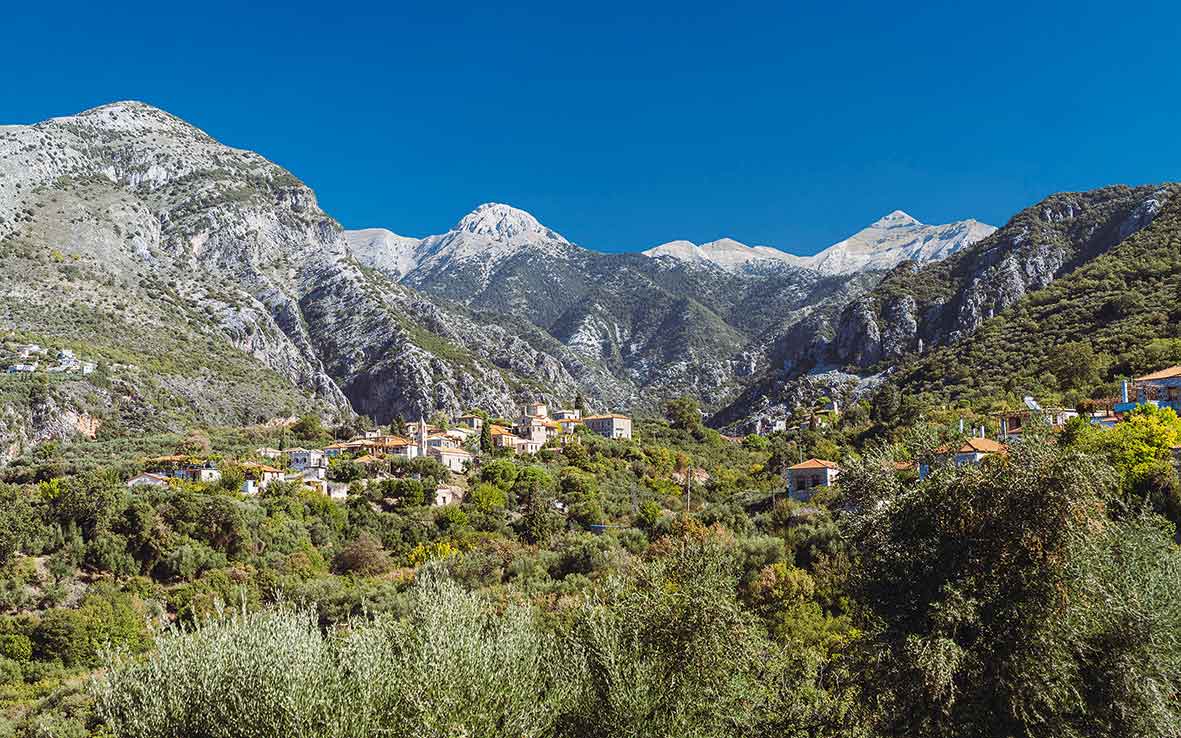
The highest peaks of Mount Taygetos tower over the settlement of Tseria: Halasmeno (2,204m) on the left and Prophetis Ilias, also known as the "Pyramid" (2,407m) on the right.
© Nicholas Mastoras
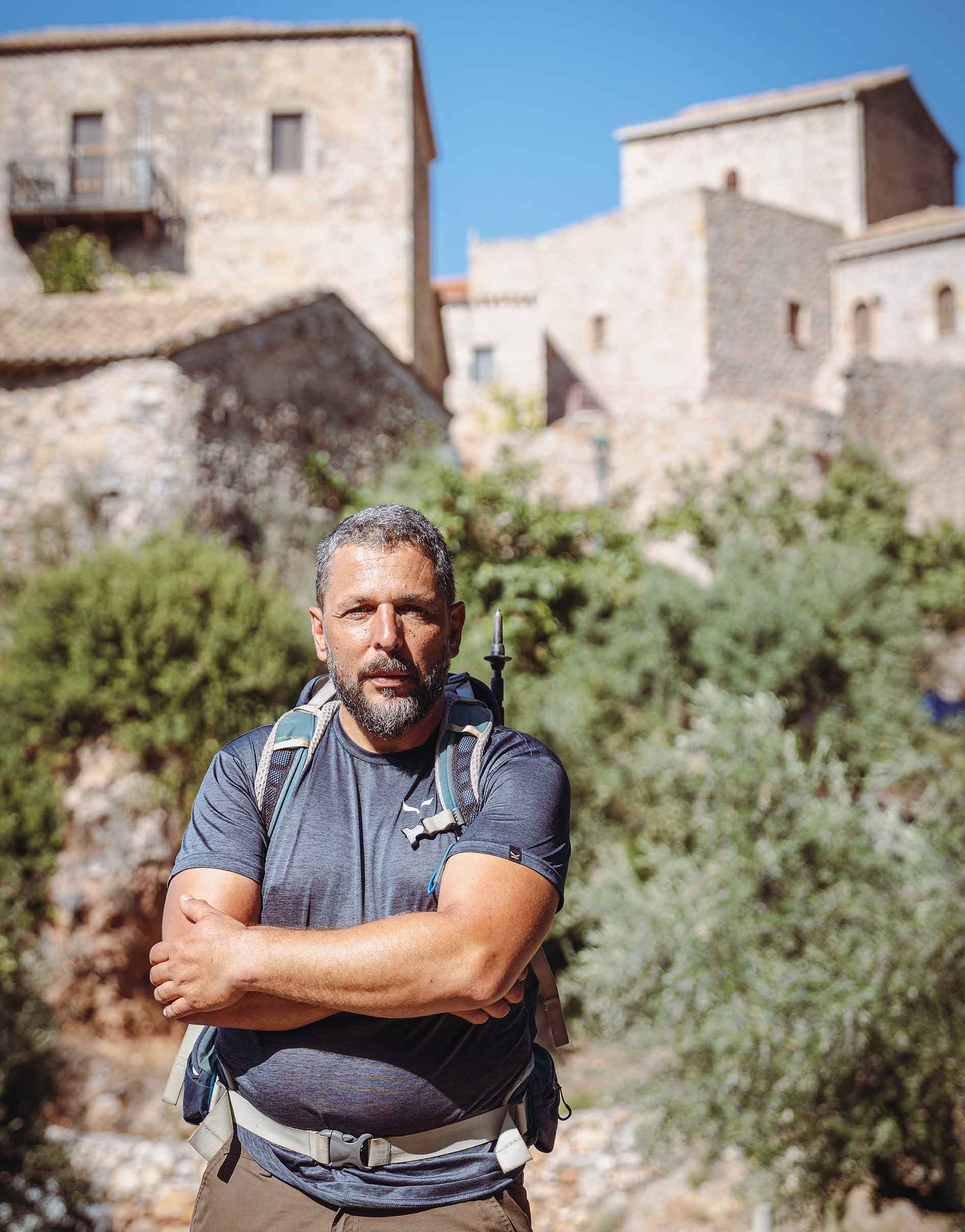
Yiannis Avrameas of 2407 Kardamili Mountain Activities.
© Nicholas Mastoras
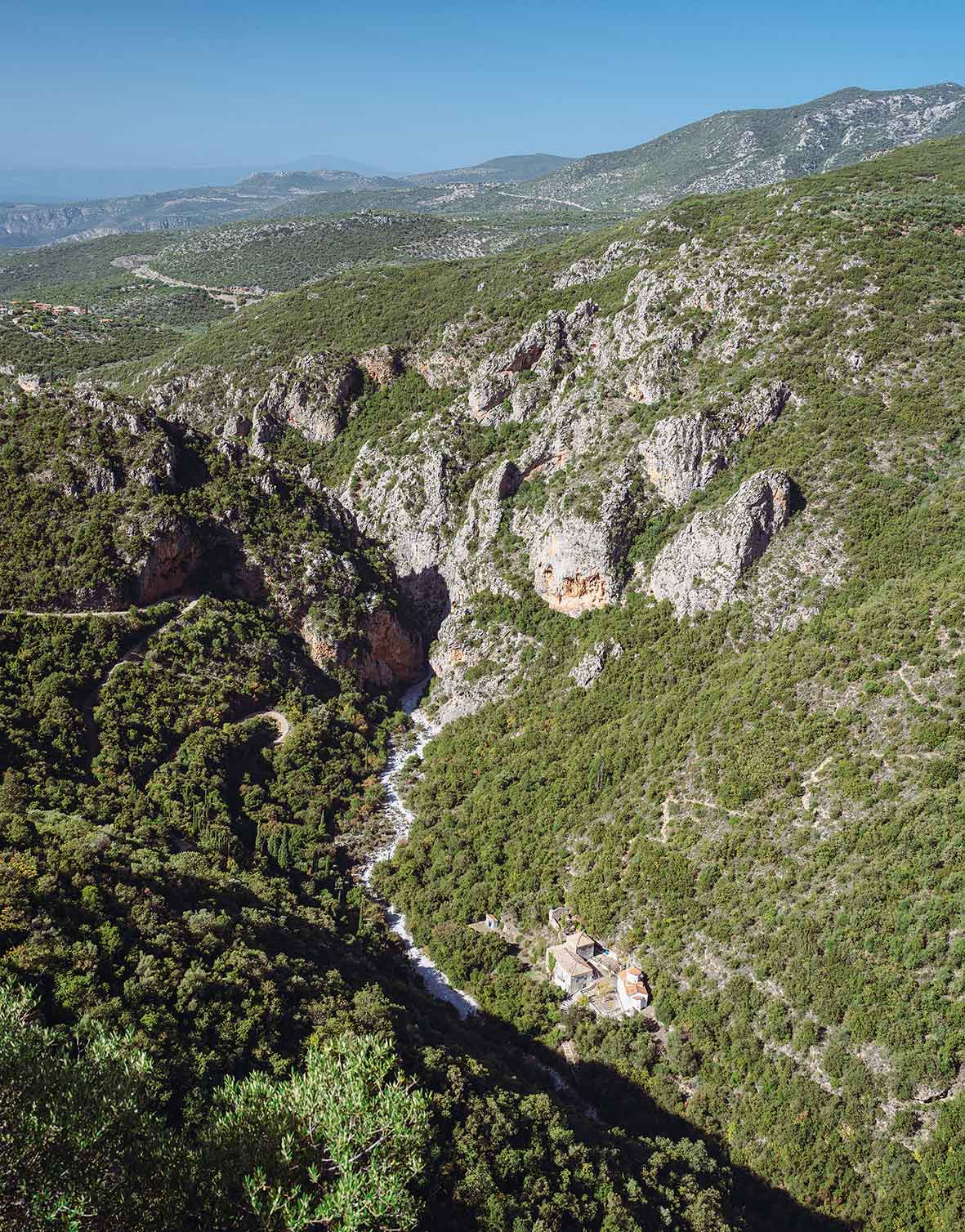
The undulating landscape is a hiker's paradise.
© Nicholas Mastoras
The third stop of the field and nature trek in Messinia is Exo Mani, the northwestern (Messinian) part of the Mani peninsula. Here, we find Yiannis Avrameas, the heart and soul of 2407 Kardamili Mountain Activities (outdoor activities center), who is also the organizer of the Taygetos Challenge. With his great experience in hiking and deep knowledge of the region, forged by personal experiences, we start from Kardamili for a circular route, which has even been included in “The Routes of the Olive Tree,” an integral part of the Mediterranean network of paths.
What do we see? Olive groves and stones, stones and olive groves, the peaks of Mount Taygetos, Vyros Gorge, the old path paved with cobblestones that disappears and reappears as if playing hide and seek with us, and Exohori with its café and historical folklore museum.
Here we make a long stop, because the museum has lots of surprises for us: a numismatic collection of banknotes from the early post-revolutionary years, with bonds and their equivalent in piasters, with the depiction of the first governor of the National Bank, Georgios Stavros, found everywhere from the five drachma coin to the 5000 drachma banknote. The museum’s biggest exhibit, however, is a photo of the children of the Primary School of Exohori, dated 1965-1966. In the middle and to the right, we see a little boy, Yiannis Koumedeas – who was a pupil at the time – who now welcomes us to the museum. This is arguably the single greatest value of rural folklore museums: that they are often staffed by local people, who know better than anyone how to describe the objects on display, quite simply because they once used them in their daily lives.
The stone-built church of Aghia Sophia, the twin Hellenistic tombs of Dioscuri and the fortified Troupakis-Mourtzinos complex complete the stops, lending touches of culture to a route in which the olive trees and nature are the main protagonists.
The circular path Kardamyli-Exohori-Kardamyli is suitable for a long hiking crossing lasting about four hours. But you can also break it down, i.e. drive to Exohori and continue hiking to Kardamyli. If you are an experienced hiker, you can get a hiking map and cross the trail yourself. If you are a beginner, prefer to hike with a guide. The company 2407 of Yiannis Avrameas organizes such hikes (www.2407m.com, [email protected]).
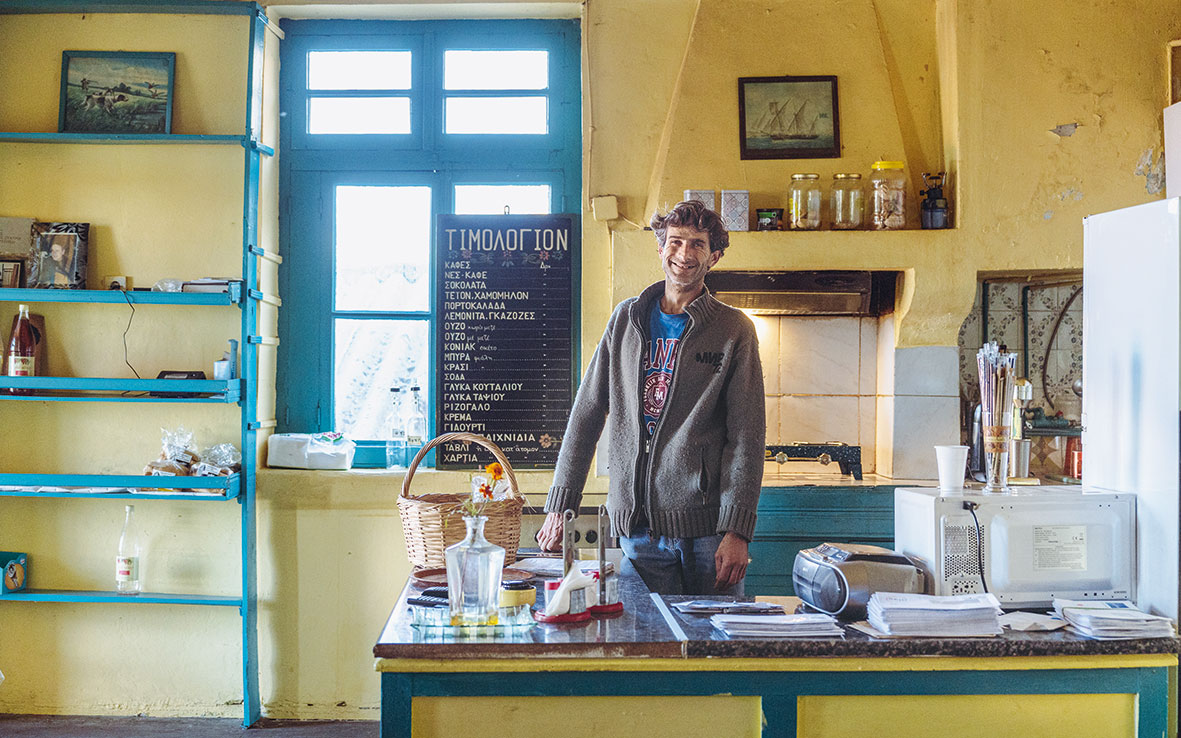
It's worth making a stop at the café of Exohori.
© Nicholas Mastoras
For the grand finale on our trip, we stop at a place that has no obvious touristic interest, but proves that agritourism in Messinia has its own distinct character; a meeting that sums up the place and its people as a whole.
In Messinia, the roots that connect the gardens with the food on the table are deep. The place is fertile and the locals learned to get the raw materials from their own gardens, which is still the case today. That is what we realized once we arrived at the house of our friend, Mrs Stavroula Giannopoulou, who, after forty years in Athens returned to her hometown, the village of Mikra Mantineia, 8km outside of Kalamata. From the age of ten she worked with her parents in olives, figs, wheat and silkworm cultivation. Nowadays, she does not work at such an intensive rate, but still busily cultivates her garden for at least two hours every day.
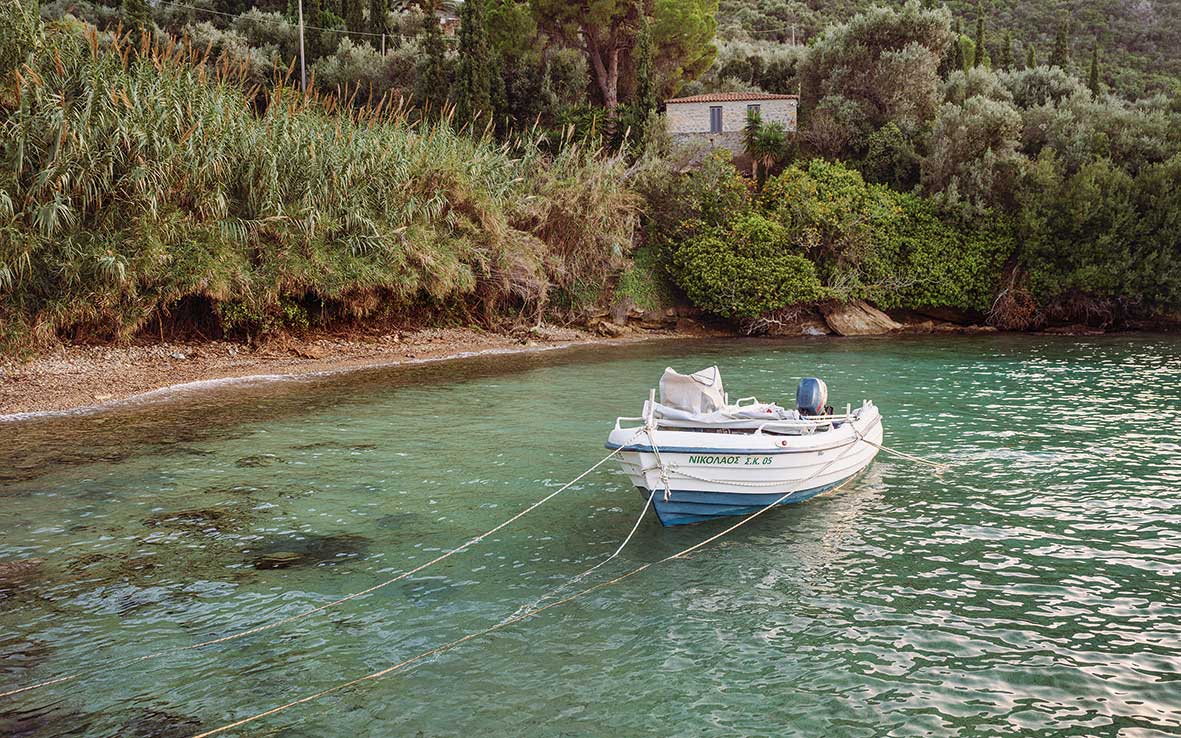
Kitries, in the small harbor next to the beach.
© Nicholas Mastoras
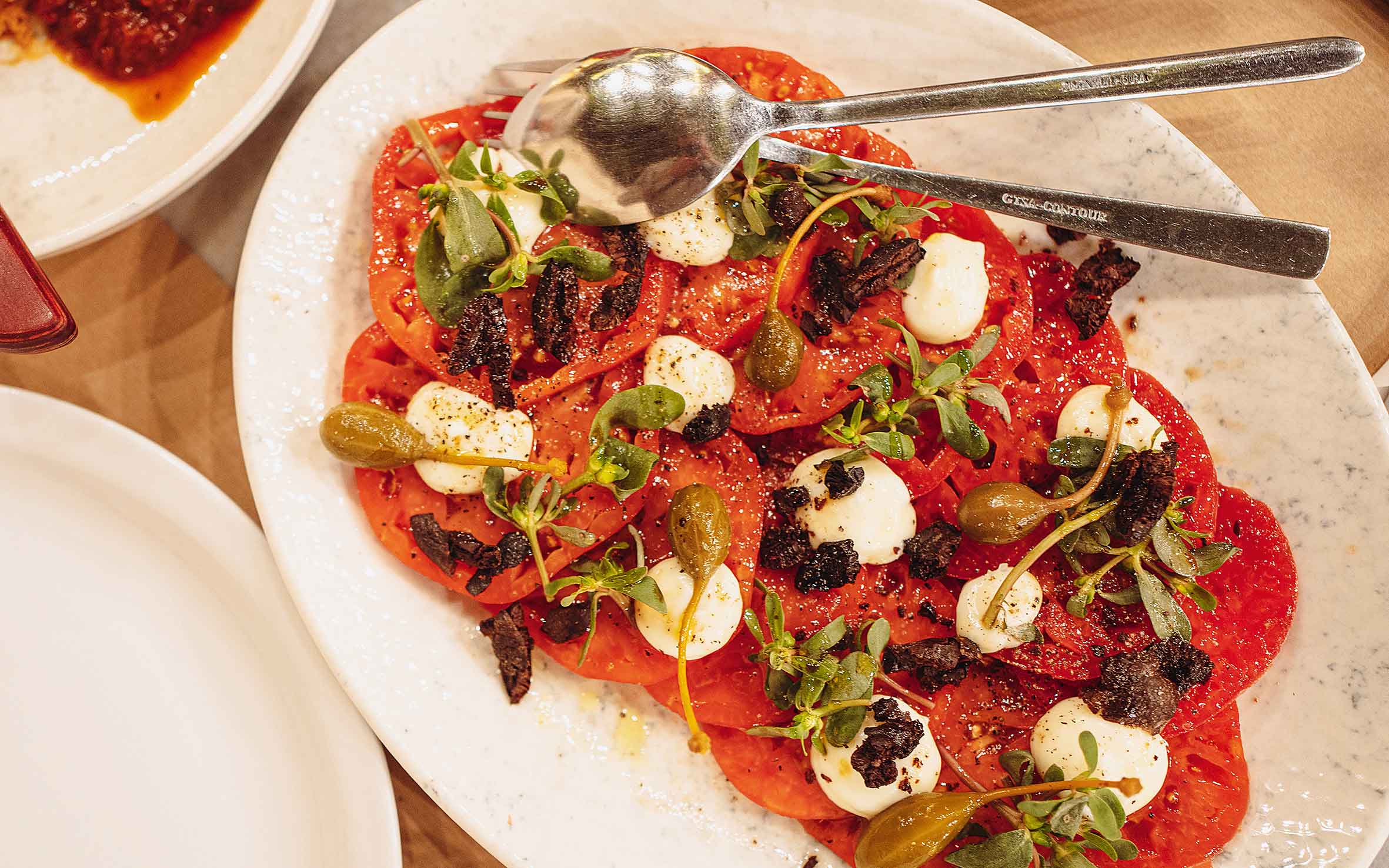
Chrysomallis Wine & Grocery Shop
© Nicholas Mastoras
In the garden below her porch, she plants spinach, radishes, cauliflower, cabbage, onions, beans, and potatoes. In the summer she cultivates tomatoes, zucchinis, green beans, eggplants and peppers. Her children in Athens get regular supplies from her garden, and she also sells her own produce at the local farmer’s market.
In addition to growing fruits and vegetables, she makes jams, her own limoncello, diples (fried dough dipped in honey), lalagia (rings of fried dough), hylopites (pasta made from flour, eggs and milk), olive oil rusks and bread. “I knead once every 15 days and bake the bread in the kitchen oven.” This is how her daily life goes, in a house with a lush garden – full of vegetables and fruits, rose bushes, geraniums, jasmines and evening primroses – which looks like a personification of Messinia itself. The agritourism of a destination is built on such houses and their gardens, and people like her.
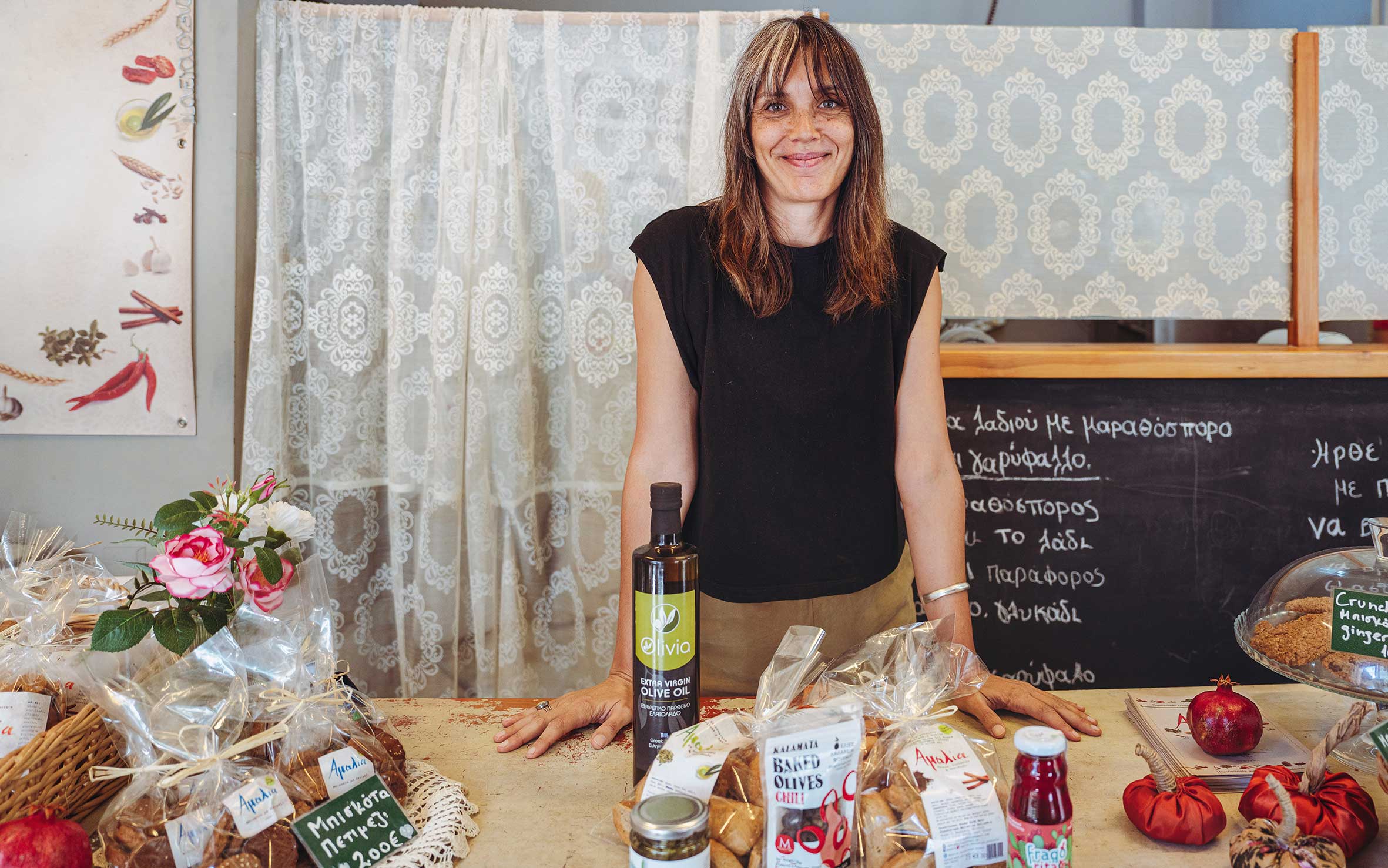
Traditional products workshop Amalia.
© Nicholas Mastoras
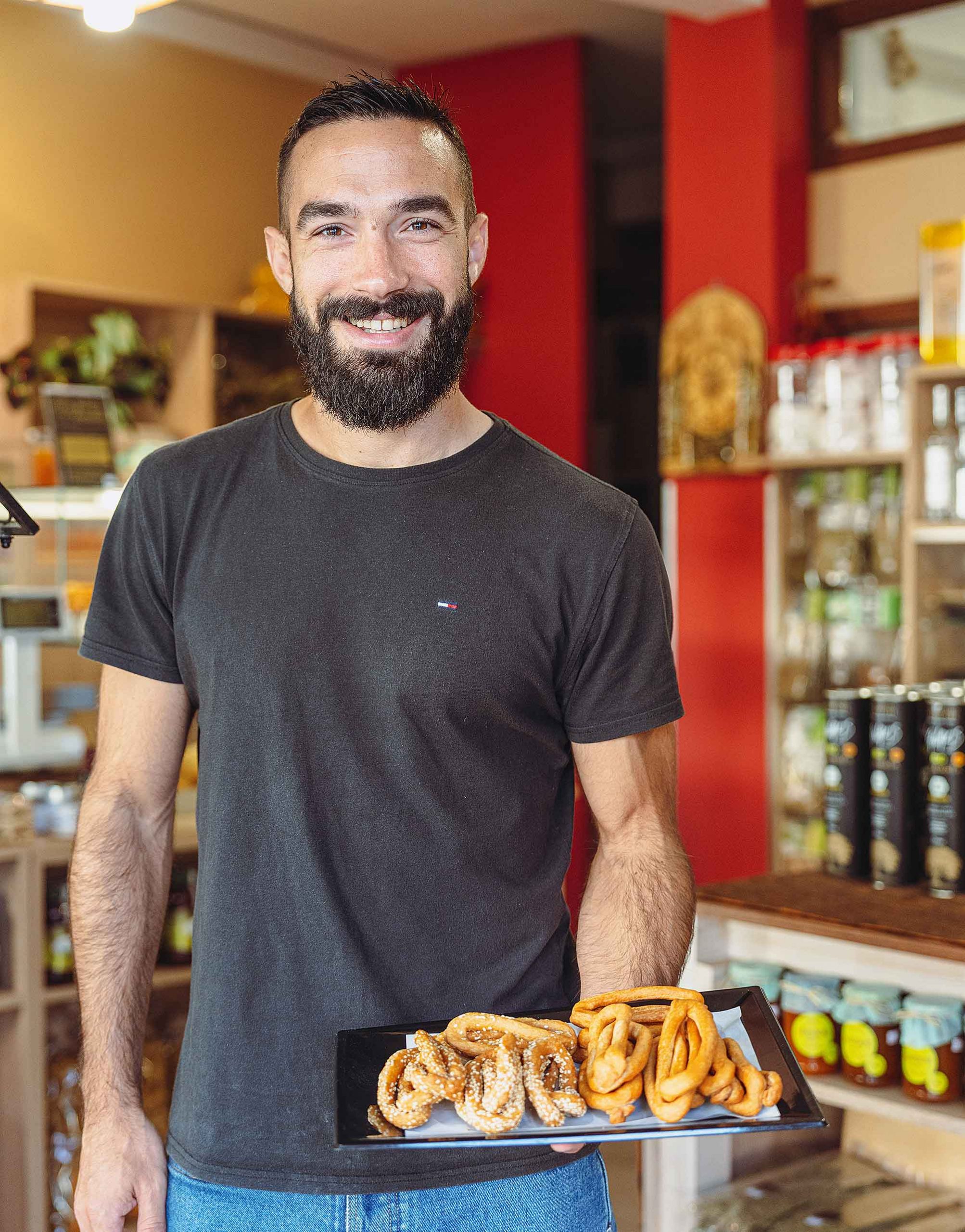
Gefseis Manas Gis
© Nicholas Mastoras
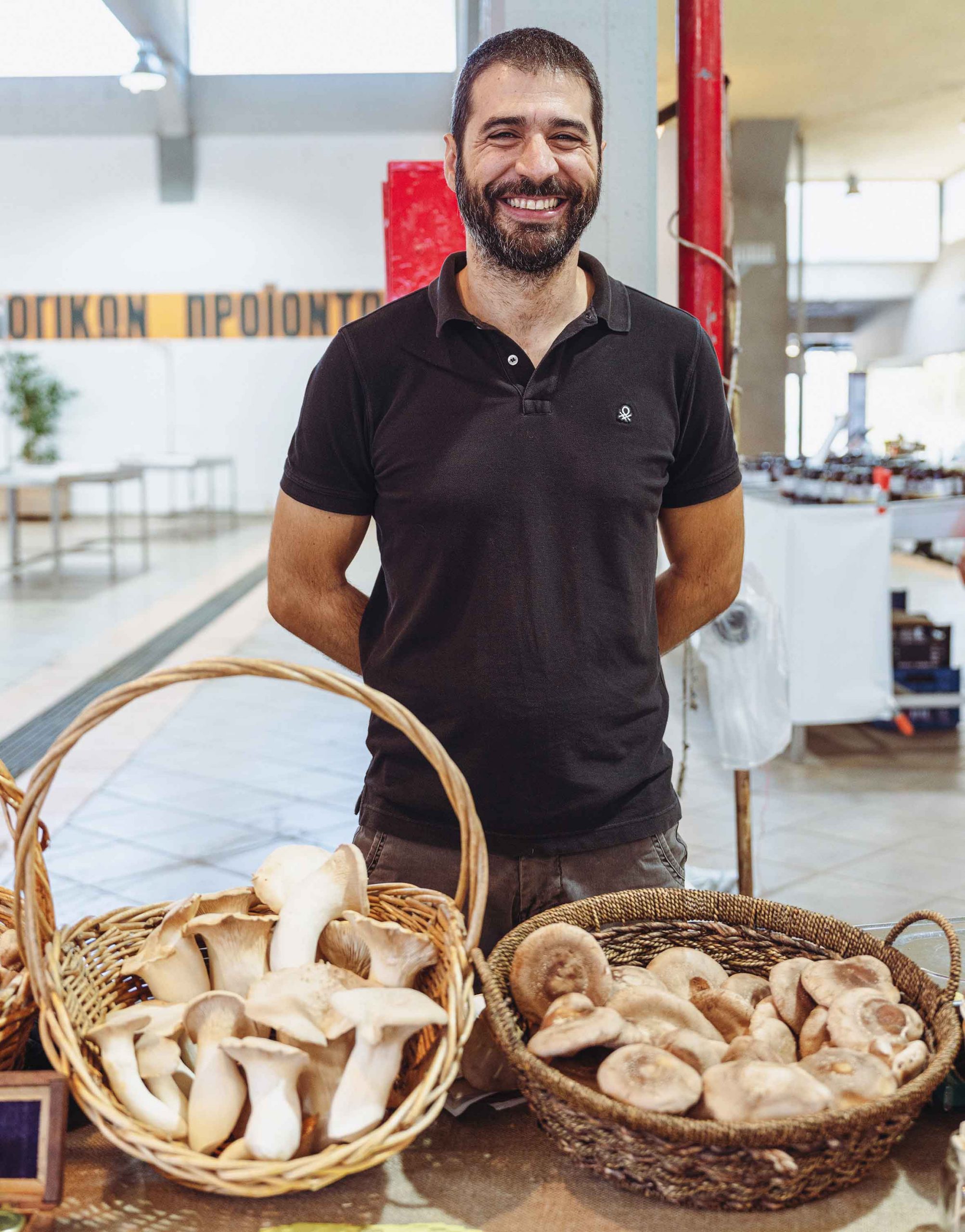
At Kalamata's Central Market
© Nicholas Mastoras
Born in Kalamata, with roots from Asia Minor, 35-year-old Konstantinos Vassiliadis worked in various kitchens in Greece and abroad – among others at Costa Navarino in Pylos and Amanzoe in Kranidi – before returning to Kalamata and opening his own place. Mple Kanarini was a project implemented during the second quarantine period of the Covid-19 pandemic.
“I didn’t know what the future held for me, I had some savings and I thought: here we are, we’re going to open a little shop.” He didn’t want a dinner restaurant, he preferred a “gastro-kitchen,” as he puts it, “a cookshop that is not a fast food restaurant. We have a somewhat different perspective, we don’t have a bain-marie display case, our philosophy is that the food is cooked in Dutch ovens and cast iron pots, the menu is different every day, we get the fruit and vegetables from gardens and of course at the farmer’s market of Kalamata,” which received praise in a recent publication of the French newspaper Le Figaro. To a large extent, the ingredients used at Mple Kanarini come from various suppliers in Messinia and the surrounding areas and not from a large wholesaler.
“I get potatoes, olives, figs or tomatoes from separate suppliers, which is difficult, because I have to deal with many phone calls and many orders. In one dish you can probably find products from 15 suppliers.” The project is complicated. But it is worth it, because the customer gets to taste tomatoes from Giannitsanika to Taygetos, potatoes from the village of Aris, olive oil from Trikorfo, meat from Milea in Mani and fresh fish from the boats that moor at Kalamata pier. In terms of sustainability, Mple Kanarini uses three types of bins: conventional, recycling and composting for organic waste. This means that some products of the Messinian land that were used in the kitchen return to where they were originally created, in the form of fertilizer.
Messinia experiences a different reality than Athens in terms of weather, as here the summer has a prolonged duration. At the end of October when we visited, the sun was driving many locals into the sea. We followed their example at Kitries Beach, on the eastern side of the Messinian Gulf. The sea was warm, it was sunny and there was no wind. If you like swimming in autumn, take a swimsuit with you, because even in November you can get unexpected summer days.
Messinia is an ideal weekend destination due to its good road connection with Athens (239km/2½ hours), which makes the trip short, safe and pleasant. The cost for tolls and fuel is estimated at 45-50 euros, for a one-way trip.
Messinia is a prefecture with geographical diversity: it has a long coastline and a strong mountainous topography, since it shares Mount Taygetos, the highest mountain range of the Peloponnese, with Arcadia and Laconia. Settlements, villages and cities are scattered inland but also by the sea. Nevertheless, its infrastructure serves summer tourism more than winter tourism. Many seaside accommodations close at this time of year, while inland village guesthouses are scarce. Kalamata is a convenient city, which you can use as a base for your excursions.
The five-star Grand Hotel (37 Navarinou, Tel. (+30) 27216.001.60, grandhotelkalamata.com, from 153 euros for a double room, breakfast included) has invested in luxury. It has rooms and suites, while the menu of the restaurant has been created by the Michelin star chef Alexandros Tsiotinis and his team.
More affordable and in a very convenient location is the Kalamata Art Hotel (12 Mitropetrova, Tel. (+30) 27210.271.51, kalamataarthotel.com, from 65 euros for a double room; breakfast is not included), with colorful rooms in pale tones.
If you prefer accommodation in the countryside, half an hour outside Kalamata to the north, in the village of Poliani on Mount Taygetos, is the Taygetos Relaxing Cottage (Tel. (+30) 6993.944.131, taygetosrelaxingcottage.com, from 70 euros for two persons). The stone guest house for six persons has a view of the mountain slopes, a dining room, a lounge with a fireplace, an equipped kitchen, a pool table and a BBQ.
In Chrysomallis Wine & Grocery Shop (32 Ypapantis, Tel (+30) 27210.827.59) you can find seasonal products sourced from the farmer’s market of Kalamata, from producers from Alagonia, Mikromani, Mani, etc. The dishes on its menu change frequently. Among other things, here you can taste excellent eggplant with handmade mayonnaise and beef ribs with grape syrup sauce and carrot purée.
Foino Food & Wine (35 Ypapantis, Tel. (+30) 6940.886.536) is a bistro of a similar style, with friendly staff, a well-kept space and strong cuisine, that uses organic products from Messinia ̶ and not only ̶ and has an updated wine list that includes sparkling, red, rosé, white wines and of course desserts.
At Mple Kanarini (34 Kritis, Tel. (+30) 27210.430.75) the menu changes daily. On the day we visited, we tried kavourakia (wild greens) with sourdough bread, feta cheese and fresh early harvest olive oil made the day before, salad with tomatoes of various varieties, such as Hontrokatsari from Messinia and cabbage rice (also known as as maporyzo) with wild fennel and yogurt.
Just outside Kalamata, towards Verga, there is Ximeroma (38 Kalamata-Areopolis Provincial Road, Tel. (+30) 27210.413.16) where you can taste traditional Greek dishes (fish, meat, boiled vegetables and Messinian cheeses, such as sfela and feta), while if you visit Kardamili, it is worth making a stop at Babis (Kardamili, Tel. (+30) 27210.738.66) for a souvlaki paired with Nema beer.
Stop by the Central Market (31 Spartis, agorakalamatas.gr), preferably on Wednesday or Saturday, when it also hosts the farmer’s market with producers from various parts of the Peloponnese. The sight is unique, with seasonal vegetables and fruits in all possible color combinations. We found chestnuts, yellow and green beans, pink tomatoes (with the spicy name “Breast of Venus”), grapes, apples, quinces, persimmons and prickly pears, among many others. Next to them, there are aromatic herbs such as oregano and wild tea from Mount Taygetos, PDO cheeses (feta, sfela), sheep yogurt, fish and salt pork.
A new arrival on the culinary map of Kalamata is Harmafoods (61 Nedontos, Tel. (+30) 6944.893.773, harmafoods.com), a beautiful shop that opened at the end of October. Its peculiarity is that it specializes in mushrooms. You will find them fresh, dried, in sweet preserves, pasta, risotto and breadsticks but also in a street food version, as the kitchen prepares everything from mushroom pies to omelettes with mushrooms.
It is also worth visiting Amalia (7 Psaron, Tel. (+30) 27215.500.79, amaliagourmet.gr), the workshop of traditional products of Sophia Houliara, who comes from Mani. Here you can find various kinds of traditional delicacies (oil rusks, diples, lalagia), biscuits (with grape syrup, lemon, orange or oat) and various products of small local producers. Be sure to try the baked olives.
At Gefseis Manas Gis (37 Spartis, Tel. (+30) 27211.812.08) they have their own workshop, where they prepare lalagia, diples and various kinds of pasta, while they also sell various other products (dried figs, olives, etc.).
At Spinos Coffee Micro Roastery (5 Germanou, Tel. (+30) 27210.215.20, spinos.coffee), in addition to coffee to go, you will also find a range of single-variety coffees or blends (from Ethiopia, Costa Rica, Guatemala, etc.) to buy. A standout is Spinos Greek decaffeinated coffee, in artwork packaging depicting a bearded and hatted male figure straight out of a noir novel.
Not all surprises are pleasant, but...
Among the many city eateries offering...
What to do and where to...
A Thessaloniki expert selects 13 spots...